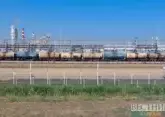Russia's energy, finance and economic development ministries will oblige Russian oil companies to send at least 17.5% of their annual production to domestic oil refineries, according to the instruction given by Russian Prime Minister Dmitry Medvedev following the governmental meeting.
The document was published on the Russian government's website. The amendments providing for obligations to send oil to refineries capable of producing motor fuel must be prepared before October 10, RBC noted.
The Kommersant reported in August, citing its three source in the industry, that the proposal came from Rosneft, which owns 13 major oil refineries.
A leading analyst of the National Energy Security Fund, a lecturer at the Financial University under the Government of the Russian Federation, Igor Yushkov, speaking to Vestnik Kavkaza, noted that quotas for oil refining is a logical consequence of the tax maneuver, which transfers the burden from the oil industry workers to the wells. "Previously, oil companies paid an oil and gas production tax and duty on oil exports, which provided cheaper oil for the domestic market. Now the situation will be different: export taxes are abolished, an oil and gas production tax increases, so supplying domestic markets is not as profitable as the export of raw materials. In order to protect the needs of the domestic market, they are developing such mechanisms," he explained.
"By the way, the question arises why there was a need to invent a tax maneuver in the oil industry at all, if the state then donates the money received in the form of a reverse excise tax to oilmen and forces them to supply oil to refineries and process them," Igor Yushkov said.
Deputy director of energy policy of the Institute of Energy and Finances, Alexey Belogoriev, agreed with Yushkov. "This is a security measure in the framework of the new tax maneuver in order to avoid a shortage of motor fuel in the domestic market, after the companies start exporting more oil due to a decline in export duties. In general, such measures are not quite market in nature,due to the fact that the role of state regulation in the industry is increasing," he said.
"If we talk about large companies, then no costs emerge here for them, since they supply more than 16% of produced oil to the domestic market. It will be difficult to predict how it will be implemented by companies which do not have their own refining. Not all small and medium-sized companies can provide such a level of refining, although the majority in this sector supply a much larger share of oil to the domestic market,” Aleksey Belogoryev added.










